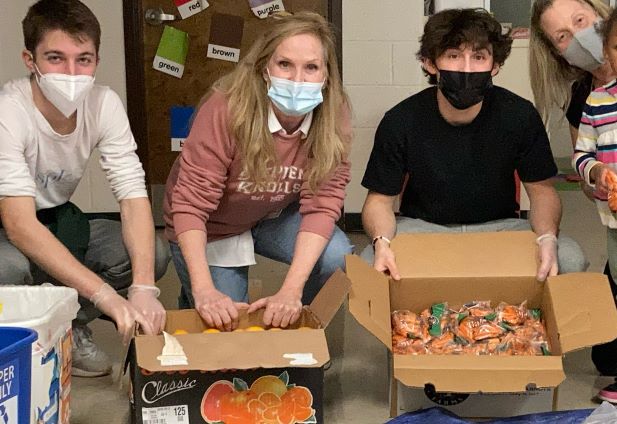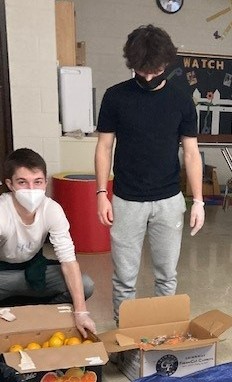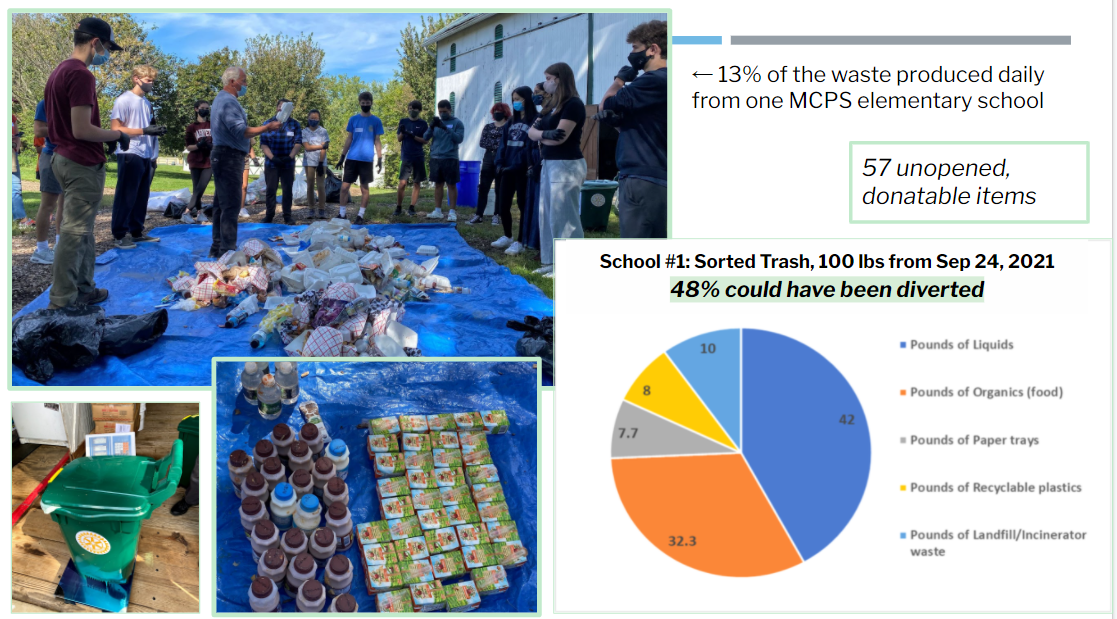Reimagining School Food Waste

What started as a student-led environmental initiative to reduce food waste in Montgomery County Public Schools (MCPS) has grown into the Coalition to ReImagine School Waste. Building on an initial pilot program, the effort is poised to expand to all MCPS schools and has the potential to reach all public schools in Maryland. Students from Bethesda-Chevy Chase and Richard Montgomery High Schools started by conducting a waste-sort study in a few schools. “We see so much food being thrown away every day at school,” says Ethan Weiss, BCC HS senior. “At the same time, we know how many hungry families are living in Montgomery County. We knew more could be done to make things better, not just for the climate but for our community!”.
Students discovered that approximately 40% of school cafeteria trash is food waste. About half of this is food scraps and paper trays. The remaining half is uneaten food, including whole fruit, bottled juice and milk, and unopened fruit cups that could be recovered and distributed to those who are hungry.

Students recover 45 lbs. of oranges and carrots in one day at Stephan Knolls school and deliver to Manna Food Center.
The students joined forces with other waste-reduction advocates from Mountainside Education & Enrichment, the Maryland Public Health Association, and dedicated staff from MCPS, as well as public officials including Maryland State Delegate Jared Solomon, Delegate Lorig Charkoudian and State Senator Shelly Hettleman. The Coalition received a $48,000 two-year grant from the World Wildlife Fund to implement food waste composting and food recovery in eight pilot MCPS schools.
Working closely with John Meyer III, Recycling Manager in the Sustainability and Compliance Division of MCPS’s Department of Facilities Management, the Coalition to ReImagine School Waste started composting programs at the pilot schools, including Clarksburg Elementary School. Student “ambassadors” from the upper grades guide younger students in the lunchroom on the proper ways to separate food into clearly labeled containers for recycling plastics and composting food scraps.
The next phase is to recover and redirect unopened packaged food, uneaten fresh fruit like apples and oranges, and eventually refrigerated milk and packaged produce like carrots, to families who are food insecure. The Coalition and John Meyer reached out to Manna Food Center’s Community Food Rescue (CFR) program to implement this phase. Together we discussed the more challenging logistics of collecting, handling and transporting food safely. Now that Covid restrictions have eased and students have returned to eating in cafeterias instead of the classroom, students can once again put unwanted food on “share tables” for any other student to take. However, refrigerated foods such as milk and sliced carrots need to be kept under proper temperature control. Also, each school has safety protocols for all visitors, so food runners must check in and be accompanied by school staff for food pick-ups.

Students conduct a waste sort and found that 40% of trash was food.
With enthusiastic support from school staff, Stephen Knolls School, a special education program for students who range in age from 3-21 years, will be the first MCPS school to pilot food recovery. “Stephen Knolls is thrilled and honored to be part of this food recovery program,” Principal Kim Redgrave shares. “We have relationships with Manna Food Center and Operation Gratitude and hosted numerous food and clothing drives to help our neighbors. Knowing that our commitment to this food recovery program could provide for our neighbors is important to us.”
The school’s Staff Development and Green Team Lead, Jean Kiernan, will be the on-site coordinator. She is especially excited to integrate food recovery into student learning. “As a green school, our biggest strength is that lesson planning is institutionalized. New teachers are eager to receive more materials about food waste, food recovery, and meal planning and integrate that into teaching. From a sensory perspective, working with food also helps address our students’ needs.”
The first weekly food recovery at Stephen Knolls is slated for this spring. Lessons learned there will be applied to other MCPS schools. John Meyer anticipates that we will be able to address all the logistical challenges of food recovery and has his sights on expanding the program into all MCPS schools next year. The Coalition to ReImagine School Waste does not want to stop there. The student-led efforts have inspired “Public Schools Grant Program to Reduce and Compost School Waste” bills in the Maryland legislature, sponsored by Del. Charkoudian, Del. Solomon (HB150) and Sen. Hettleman (SB124). These bills would provide $500,000 to support Maryland schools interested in starting food scrap removal and food recovery programs.
It’s inspiring to watch a student-led, food waste reduction idea blossom into countywide school and hopefully, statewide school food recovery and composting programs. Stay tuned for updates on lessons learned in the MCPS pilot schools and how public policy discussions in the Maryland legislature progress.

